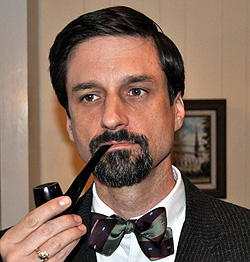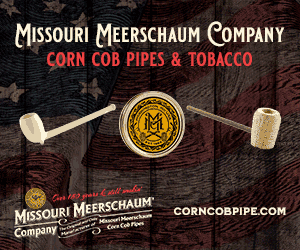By Michael P. Foley
 Raised in a proud Irish American family – the "P" in my byline is for Patrick – the annual watching of the 1952 classic film The Quiet Man was a cherished ritual. Even before acquiring that marvel of technology, the VCR, we could always count on a UHF channel (remember those?) televising the movie around St. Patrick’s Day. No matter how many times I saw it, it was always a treat. John Wayne, who later said that this was the favorite of his movies, is superb as Sean Thornton, the quiet American who returns home to his native Ireland. And Maureen O’Hara is at her very best as Mary Kate Danaher, Thornton’s fiery, redheaded love interest. The humor is what jaded audiences today would call camp, but under John Ford’s masterful directorship, it is wonderfully human and always arch.
Raised in a proud Irish American family – the "P" in my byline is for Patrick – the annual watching of the 1952 classic film The Quiet Man was a cherished ritual. Even before acquiring that marvel of technology, the VCR, we could always count on a UHF channel (remember those?) televising the movie around St. Patrick’s Day. No matter how many times I saw it, it was always a treat. John Wayne, who later said that this was the favorite of his movies, is superb as Sean Thornton, the quiet American who returns home to his native Ireland. And Maureen O’Hara is at her very best as Mary Kate Danaher, Thornton’s fiery, redheaded love interest. The humor is what jaded audiences today would call camp, but under John Ford’s masterful directorship, it is wonderfully human and always arch.
The Quiet Man is also, as one perceptive observer put it, "sex ed without the word ‘sex’ ever being used." Issues involving sexuality, community, and marriage are explored in a way that preserves the innocence of the youngest viewers while giving the grown-ups something serious to ponder. Only in hindsight do I realize the debt I owe to The Quiet Man in teaching me the higher meaning of, rather than the mere biological facts about, the love between a man and a woman.
And only now do I realize the role that smoking tobacco plays in the movie. Unlike the explicit references to "the drink" (mostly porter and whiskey), there are virtually no lines about smoking. Yet smoking in the movie is everywhere, and in two conspicuously different ways: the cigarette-smoking of Sean Thornton and the pipe-smoking of the local Irishmen.
Different Smoke for Different Desires
 This is significant. As I have argued elsewhere, the three kinds of smoking tobacco – cigarettes, cigars, and pipes – correspond respectively to the three "parts" of the soul: the appetitive part, which craves physical pleasure; the spirited or irascible part, which jockeys for recognition and honor; and the rational part, which longs to know the truth. (If you haven’t read my little essay on the subject, you might want to now – Tobacco and the Soul )
This is significant. As I have argued elsewhere, the three kinds of smoking tobacco – cigarettes, cigars, and pipes – correspond respectively to the three "parts" of the soul: the appetitive part, which craves physical pleasure; the spirited or irascible part, which jockeys for recognition and honor; and the rational part, which longs to know the truth. (If you haven’t read my little essay on the subject, you might want to now – Tobacco and the Soul )
In The Quiet Man, Sean Thornton is a prizefighter who returns to the Emerald Isle after accidentally killing a man in the ring. Haunted by guilt, he swears off fighting as well as greed. "I didn’t go in there to outbox him," he tells the village parson. "I went in there to beat his brains out, to drive him into the canvas, to murder him. Well, that’s what I did. For what? The purse, a piece of the gate. Lousy money."
But if Thornton has foresworn the lust for money, there is another kind of lust he hasn’t, and that is his lust for Mary Kate. From the moment he sees her glorious scarlet mane shining in the sun, Thornton is infatuated with her; and when they finally wed, he eagerly awaits the consummation of their vows. Thornton’s unbridled passion, which strikes the other characters as unseemly and "Homeric," is aptly symbolized by the fact that he is the only cigarette-smoker in the story, and a chain smoker at that. When it comes to Mary Kate, Thornton is pure appetite.
Thornton’s cigarettes contrast sharply with the straight-stemmed tapered pots of the Irish villagers, especially that of the "wise man" in the movie, the perennially sauced Michaleen Oge Flynn (Barry Fitzgerald). Since the pipe is a symbol of the rational and reasonable, it is fitting that Flynn has a pipe in his hand almost as much as he has a pint, for Flynn, even in his constant drunken haze, understands the courtship customs of Ireland and the wisdom behind them.
The Absence of Cigars and Honor
The one form of smoking tobacco that is absent from the movie, aside from one fleeting exception which I will mention in a moment, is the cigar. Although I am sure there are historical reasons for this, I also see in it a deeper symbolic value. What Thornton as a Yank cannot understand are the Irish courtship customs, such as the rules regarding the dowry. Thornton dismisses all talk of money as greed and even suspects that his wife Mary Kate, who insists on the proper transmission of her dowry, is merely being a moneygrubber. He does not understand that these customs are not ordered towards wealth but towards honor. "It must be strange to you from America," the Reverend Playfair explains to him, "but it’s an old, old custom here, and believe me, it’s a good custom. The fortune means more to her than just the money."
 Contrary to Immanuel Kant’s infamous definition of marriage as a mere legal agreement to use each other’s genitalia, marriage has as much to do with honor and respect as it does with the satiation of lust: honor and respect for one’s spouse, one’s children, and for the community that one’s marriage and family will no doubt affect. Granted that sometimes a cigar is just a cigar, the connection between cigars and honor may nevertheless explain the one brief cameo of a cigar in The Quiet Man, when Michaleen Flynn is chomping on one the morning after Sean and Mary Kate’s wedding, no doubt confident that an honorable solution to Sean’s “terrible thirst,” as he puts it, has been found.
Contrary to Immanuel Kant’s infamous definition of marriage as a mere legal agreement to use each other’s genitalia, marriage has as much to do with honor and respect as it does with the satiation of lust: honor and respect for one’s spouse, one’s children, and for the community that one’s marriage and family will no doubt affect. Granted that sometimes a cigar is just a cigar, the connection between cigars and honor may nevertheless explain the one brief cameo of a cigar in The Quiet Man, when Michaleen Flynn is chomping on one the morning after Sean and Mary Kate’s wedding, no doubt confident that an honorable solution to Sean’s “terrible thirst,” as he puts it, has been found.
To put it in terms of the three parts of the soul: Thornton, a cigarette-smoking chimney of appetite, is suspicious of the irascible part of the soul’s desire for honor because of his bad experiences with irascibility gone awry in the ring. But what he must learn from the rational part of the soul (embodied in the wisdom of such men as Michaleen Flynn) is that one cannot live well, one cannot have a decent marriage, without honor. Just as the one kind of smoking tobacco missing in the movie is the cigar, so too is there missing one crucial element, the absence of which gives rise to the story’s main conflict: the embrace of honor properly understood.
I say "properly understood" because one of the ironies of The Quiet Man is that Thornton thought he was acting honorably all along. He did not wish to "shame himself" or his wife by pandering after lucre, whether it was rightly owed to him or not. Yet what he overlooked is that all honor is more or less hidebound, tied not to some universal code of morality but to this people with this past and these prerogatives. Despite some inevitable overlap, what is honorable for the Japanese Samurai is not what is honorable for the Southern gentleman or the Arab sheik. If all politics is local, as a certain Irish American once said, so is all honor. To be honorable, Thornton must adjust his behavior in deference to the traditions of the local community.
A Happy Resolution
Fortunately, he is able to realize his mistake before his marriage fails. After successfully obtaining the dowry from Mary Kate’s Goliath of a brother, Will Danaher (Victor McLaglen), Thornton throws the money into a furnace – with the help of his wife, no less. This dramatic gesture shows that Thornton, even though he continues to hold money in contempt, has come to accept the importance of honor and the indigenous customs that go with it. And Mary Kate’s collaboration shows that even though she often comes across as greedy, she was indeed interested in the honor-affirming part of the custom, not its monetary benefits. Not even Will Danaher is surprised to see the small fortune he has just handed over consigned to the flames.
Paper money crackling in a fire is as close as we come to Thornton’s lighting up a stogie in celebration of his saved marriage, but it’s good enough. And it doesn’t hurt that he also gives Mary Kate’s brother the drubbing that he deserves in one of the longest fight sequences in cinematic history. By the end, even the vanquished Red Will Danaher is pleased with his brother-in-law, despite having lost some of his public standing and several of his teeth in the process.
Conclusion
None of this is to suggest, of course, that the cigar is superior to the pipe, any more than it suggests that honor – as valuable and as essential as it may be – is superior to wisdom. Indeed, had Sean Thornton been a pipe-smoker (at least in the metaphorical sense), he would have never needed to learn the hard way about the nature of honor, for he would have possessed that wisdom already. Of course, if there had been no need for that hard lesson, the movie would have been awfully dull.
In any event, after the happy reconciliation with his wife and with the demands of the Irish honor system, we never again see Thornton smoke a cigarette. His erotic desires have found their proper home in the honorable estate of marriage, and he has found the serenity that comes only from wisdom. If there is anything that Sean Thornton should be smoking from this point on, it’s a pipe.

Postscript
I mentioned that The Quiet Man is somewhat camp, but that does not render it irrelevant to today’s viewers. A couple of years ago, I showed it to some of my college students, most of whom were born in the year that I graduated from high school (good Lord!). I was wondering if they would snicker at the film’s quaintness, but instead they howled with laughter at all the right times and for all the right reasons – so much so that my own little ones, who had an early bed-time, complained the next day about my guests’ guffaws keeping them up all night. But my students were also quiet at the right times, recognizing the timeless relevance of the characters’ struggles for an honorable expression of their yearnings. Afterwards, a few of us enjoyed a pipe under the stars on a clear Texas night. The wisdom of the ages, like the joy of a good pipe, can be passed on from one generation to the next. In fact, it should be.
In honor of my quiet father, Jim Foley.

Michael P. Foley, an associate professor of Patristics at Baylor University, is the author of Wedding Rites (Eerdmans, 2008) and Why Do Catholics Eat Fish on Friday? The Catholic Origin of Just About Everything (Palgrave Macmillan, 2005). |


















Michael, thank you for such a wonderful and well written article. The Quiet Man is a favorite movie of mine but I never took the time to appreciate the deeper level of significance of tobacco in the movie. I appreciate the movie even more now and will have to watch again. Being of Irish decent, this was a neat opportunity for me to enjoy the movie at a deeper level along with my pipe smoking. Thanks much!!
Well done and timely. Honor and civility seem to be religated to times past. We can use more of each today. I hope the lessons from this movie are not lost on the younger generation.
It’s an honor to have your writings here Mike.
Mike, very nice article. This has been a favorite movie of mine for 40 years, I’m only 46, and every time I watch it the more I more I am reminded of what life should be about between a man and a women. I have been married for 24 years and I am still learning about the life of a marriage. Thank you for this article, you have said more than what I ever could have.
Thank you Mike.
Your article was a joy to read.
Well thought out, with depth of understanding far exceeding any “review”.
I have to admit that I enjoy reading the exposition of what is written “between the lines” more than the reading (or as in this case) watching of the literature being discussed.
I love “The Quiet Man” too.
Great article…excellent analysis! Imagine how much would be taken away from a character’s presence and substance if you remove the pipe. Considering the vast difference between classics like The Quiet Man and most movies today, it’s no mystery as to why we rarely see any pipe smoking characters these days.
Wonderful article and well done!
“Quiet Man” is a timeless movie that I’ll forever watch especially on St. Patrick’s Day and with a pint and pipe and loving Wife.
Again, many thanks for a wonderful article!
Growing up Italian, not Irish, didn’t keep “The Quiet Man” from being a staple arond our house, too. When the broadcast media couldn’t be trusted to show our favorite movie at least once a year it became necessary to purchase the tape and a VCR to play it on. Disk followed tape and as the kids moved out, they got their own copies of the treasure.
I got something a little different from the cigarette smoking. It was rushed, not enjoyed. It was the embodyment of an addiction not a pass time. It was the symbol for the way Americans lived out their lives. Cigar smoking was absent because there wasn’t sufficient prosperity in the town to support a box of cigars, much less a tobacconist. I pretty much figured that the train conductor moonlighted by bringing in tobacco from larger, more successful towns.
Thank you for your own particular insight.
I really enjoyed this review of a genuine movie classic.
The Quiet Man was filmed in the village of Cong, and there is a museum there dedicated to artifacts from the movie, including photos of John Huston with his ever-present pipe.
Several years ago my wife and I stayed at Ashford Castle, and one of the highlights of our visit was spending time at that museum. It is located in a house, and I’m pretty sure it was the house used in the movie.
One of the most wonderfully written pieces of sophism I’ve encountered in quite a while. It got me to thinking about other, possibly parallel, trichotomies that could be worked-in as well. From psychoanalysis: the id, ego and superego; from theology: the body, soul and spirit; and from divinity: Jesus, The Holy Spirit and God The Father. Of course, sometimes a cigar is just a cigar.
Tho I’ve always liked this movie and considered it the best performance
that John Wayne gave us, your insights into custom and corollaries with
different forms of tobacco consumption add another dimension to this film.
Perhaps the Freudian overlay is best for illustration of John Ford’s symbolism
for the masses in this morality play. For me, what makes this movie endure
is the ring of truth it has to it, which is skillfully woven into the characters
in an honest exploration of issues in real life. Thank you for your perspectives.
Until fairly recently, I had bypassed THE QUIET MAN for years. A John Wayne movie that wasn’t about the cavalry or war? Heresay! Oh, I had heard about the famous donnybrook between Wayne and frequent co-star Victor McLaglen, but it wasn’t until I viewed the whole movie that I discovered the treat that Prof. Foley described. Wayne’s yankee character was a fish-out-of-water who had to learn the old axiom “when in Rome, do like the Romans”… in this case, the Irishmen… and it eventually stood him well.
Thanks for the insightful review!
A wonderful article, Professor! Just curious… what did your students think of the pipes (both Michaleen’s and yours)? Quaint? Anachronistic? Interesting?
A superb article. Being of Irish descent myself, I have always enjoyed this film.
An excellent article! I am sure your Father would have enjoyed it.
Good observations, I do love the film myself and it is said the my parents were suited for marriage as their looks reminded people of Wayne and O’Hara. The film was considered by many to be Ireland’s equal to ‘Gone with the wind”. But to the chase, the film says far more about American society that it says about Irish society. It is a romantic and false view of the ol’ sod. The old traditions have and still do continue to hold the country back in many ways. The theme of honor is also a theme of bloody Irish stubbornness. A declining minority of Irish people since the 1950’s smoke a pipe, people embracing the cigarette with a hopeful wish for modernity. If you are to ask what is the difference between a pipe and a cigarette in Irish society there is little or none, both are a good smoke, period. Highlighting the pipe as some sort of ‘holier than thou’ and soulful habit smacks of colonial arrogance and religious piety, both of which we’ve had a stomach full. “The Field” and “Ryan’s Daughter” should follow any St. Pats film viewing for a fuller understanding.
I’M TRYING TO CATCH UP. SO LET ME GIVE MY OPINION, AND LET ME SAY I DON’T GIVE A DAMN ABOUT OUR GOVERMENTS’ “BULL CHYT”… MEN, MAN HAS BEEN SMOKING PIPES FOR HUNDREDS OF YEARS AND YOU FOLKS HAVE LET THOSE “PENIS HEAD LIBERAL”. BASTARDS HAVE JUMPED IN YOUR CHYT ABOUT A AIR POLUTION AND ETC…HAVE THESE LIBERALS FIGURED OUT THAT CHINA PUMPING CRAP IN OUR AIR QUALITY THAT MAKES SMOKING A PIPE IS BAD! DUCKED THEM AND THE SADDLE THEY RODE IN ON….I SMOKED CIGARETTES FOR 30 YEARS, AND BEFORE I QUIT I ALWAYS SMOKED AWAY FROM ANYONE…..
I GUESS DRUG PROBLEMS; BORDER PROBLEMS; “HOMO’S”; GUN CONTROL; WARS WE DON’T NEED, CODLESS POLITIANS; AND SO MANY THINGS OUR CONGRESS IS, JUST A GROUP OF OVER PAID ASS HOLES LOOKING AFTER THEIR ON MONEY PEOPLE…AND KISSING ASS FOR THEIR NEXT ELECTION…
WHERE ARE WE IN THIS LAKE OF “BULL DUNG”????
YOUR OPINION IS MOST WELCOME..
JOHN “O”
PS: I’M OFF FOR A BURBOURN/WATER AND SMOKE MY SUPER PIPE….